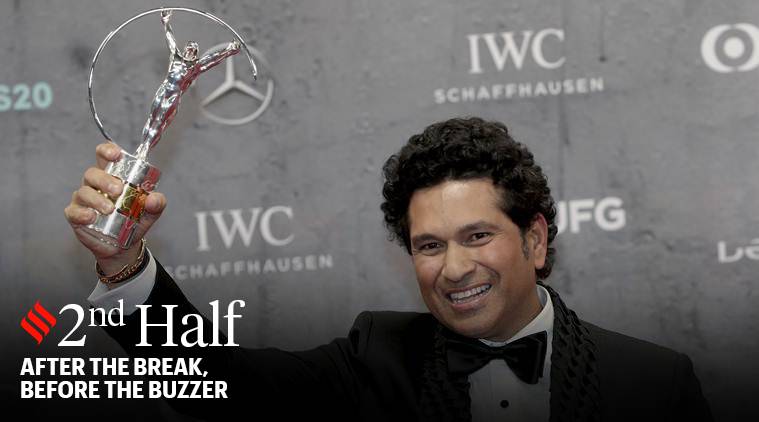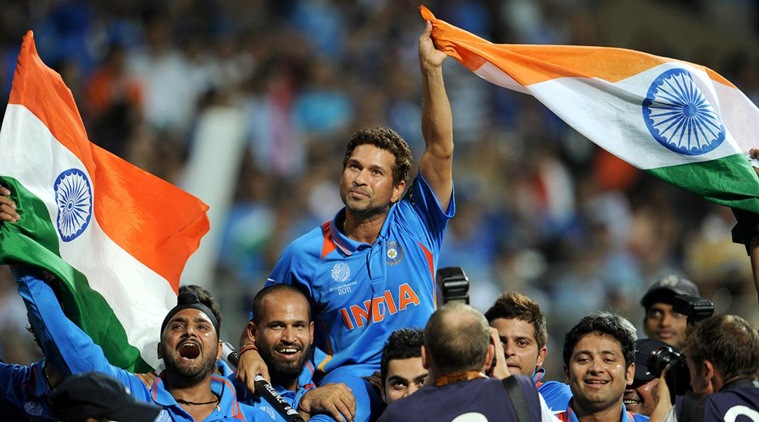 Sachin Tendulkar poses with the ‘Best Sporting Moment Award’ during the 2020 Laureus World Sports Awards in Berlin. (AP Photo)
Sachin Tendulkar poses with the ‘Best Sporting Moment Award’ during the 2020 Laureus World Sports Awards in Berlin. (AP Photo)
Ever since it came to light that Sachin Tendulkar’s ‘Carried on the shoulders of a nation’ was a contender for the ‘Laureus Sporting Moment’ of the last two decades, there was only going to be one winner. And that was even before Virat Kohli urged, in a tweet, for fans to vote for his paaji, whom he described as a “friend, teammate, mentor and icon.”
Fittingly, it was Kohli himself, in the iconic image, seen carrying Tendulkar around the Wankhede Stadium after India clinched the 2011 50-over World Cup. With two Indian cricketing icons coming together to tug at the heartstrings of more than a billion, the other 19 contenders (the preliminary list of 20 was shortlisted to five) didn’t have a chance under the sun.
 Sachin Tendulkar celebrates India’s World Cup victory, lifted by Yusuf Pathan and Virat Kohli. (AP/File Photo)
Sachin Tendulkar celebrates India’s World Cup victory, lifted by Yusuf Pathan and Virat Kohli. (AP/File Photo)
Respect but limited eyeballs
The Laureus World Sports Awards have been in existence since 2000 with honours conferred on the Sportsman and Sportswoman of the year, Team of the Year, Comeback of the Year, Breakthrough of the Year, Action Sportsperson of the Year and World Sportsperson of the Year with a Disability, apart from discretionary honours like Spirit of Sport, Sport for Good and Lifetime Achievement Awards. All of these are voted by the Laureus World Sports Academy, an association of 68 retired and eminent sportspersons. For the last two decades, the awards have gone to the likes of Roger Federer (six times, the most), Tiger Woods, Serena Williams, Michael Schumacher, Usain Bolt, Lewis Hamilton, Rafael Nadal, Novak Djokovic and Simone Biles. No arguments there.
Only the Best Sporting Moment, first conferred in 2017, is voted by the general public.
Before Tendulkar, no Indian had come close to winning any of the categories. The Laureus Sports for Good foundation would have eventually realised that though their choices garnered respect and credibility around the globe, they were missing out on eyeballs and publicity in the second biggest market in the world. The awards would garner media space for a day and then be swiftly forgotten.
It needed an India connect to make a bigger splash and what better combination of cricket and its greatest avatar.
“This is a reminder of how powerful sport is and what magic it does to all of our lives.”
A God for a nation. An inspiration worldwide.
And an incredible speech from the Laureus Sporting Moment 2000 – 2020 winner, the great @sachin_rt 🇮🇳#Laureus20 #SportUnitesUs pic.twitter.com/dLrLA1GYQS
— Laureus (@LaureusSport) February 17, 2020
Not much competition
Take a look at the four other shortlisted ‘moments’ for the award.
One of them is how Chapecoense, a Brazilian club, suffered a plane crash on way to the 2016 Copa Sudamericana finals, with all but three players dead. It details how they regenerated from the rubble, picked up the pieces and revived itself as a club. Great and inspiring as the story is, it loses recall value outside Brazil as time goes on and becomes just a footnote in history.
Mick Schumacher is, till now, known mostly for his illustrious surname. He is trying to make a name for himself but has yet to reach the Formula One level.
Xia Boyu is a Chinese double-amputee who managed to climb Mount Everest on his fifth attempt at the age of 69 in 2018. It is a highly inspirational story, one would argue more than Tendulkar’s, and a tribute to the enduring human spirit, but Xia’s country is not too used to voting (as one would imagine) and anyway, has more pressing matters of life and death to concern themselves with when polling was on.
South African swimmer Natalie du Toit returned to the pool despite having her left leg amputated following a scooter accident, and even competed against able-bodied swimmers at both Commonwealth and 2008 Olympic Games. But as she finished 16th in the 10km open water marathon, her feat wouldn’t have much recall value outside her home country.
Where’s the comparison?
Compared to Chapecoense, Du Toit and Xia, who encountered far greater physical and psychological challenges, Tendulkar and India just won a cricket tournament, on home soil, for which they were favourites anyway. Beating Sri Lanka in Mumbai was always the more likely outcome, and Tendulkar himself had a miniscule role in winning the final with Gautam Gambhir and MS Dhoni playing the leading parts. And going by the craze for cricket, India’s financial muscle and number of active players, it should be an upset when they don’t win the World Cup. That Tendulkar had to wait till his sixth World Cup to taste success is not a badge of honour.
If winning the cricket World Cup is in itself such a big deal, Australia won three in row, all away from home, around the turn of the century.
Deserving candidates
One doesn’t know what were the 15 sporting moments that didn’t make the shortlist. But one can definitely make a case for the following:
Usain Bolt running the 100m in 9.58 seconds at the 2009 Berlin World Championships, a mark that stands till date
Michael Phelps winning eight Olympic gold medals in 2008 and 23 overall
The 2008 Wimbledon final between Roger Federer and Rafael Nadal, considered by many as the greatest tennis match ever
Tiger Woods winning the 2019 Masters after a decade of infamy, almost giving up the game, several surgeries and turmoil in personal life
Liverpool winning the 2005 Champions League final against AC Milan in Istanbul after being 0-3 down at half time, dubbed ‘the Miracle on the Bosporus’
If one is looking for an Indian entry, one need not look further than Abhinav Bindra winning the 10m air rifle gold at Beijing 2008, India’s only individual Olympic gold till date
And as Laureus is all about Sport for Good, one can even consider Colin Kaepernick kneeling in protest against racial injustice and police brutality during the US National Anthem played before NFL games. Despite President Donald Trump’s anger, soon entire teams were kneeling, including some owners who supported Trump.
More about us than Laureus
One remembers Amitabh Bachchan being voted the greatest actor and Narendra Modi the greatest global leader in online polls, prompting some to smirk and raise eyebrows. Judging by the trolling and online abuse of anyone with unfavourable opinions about India, one realises that in contrast to the real world, it is on the web and social media that Indians rule the roost, and they have taken it upon themselves to restore the country’s glory even without any evidence to back it. Nobody can beat Indians when they put their collective might online.
It also shows which country has the most time to spare on such online polls. Laureus may have stumbled on a successful marketing gimmick.